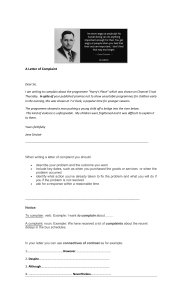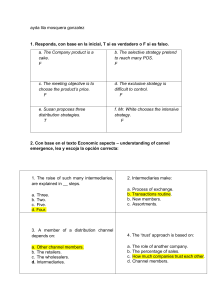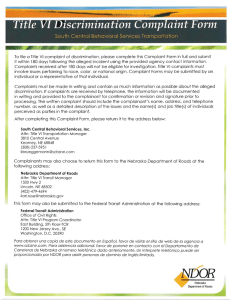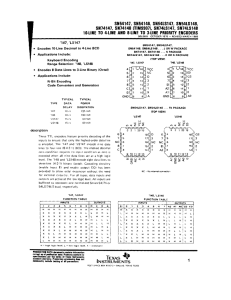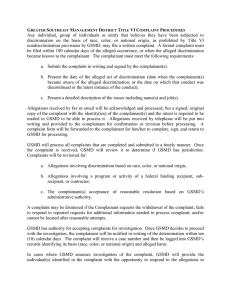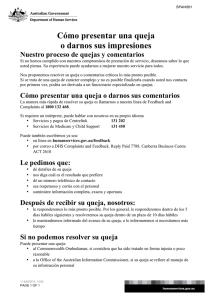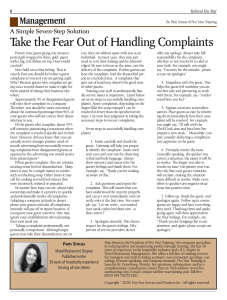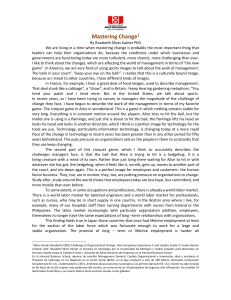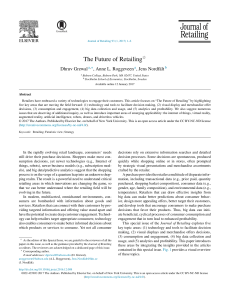BVCM015493 Consumer rights and obligations
Anuncio
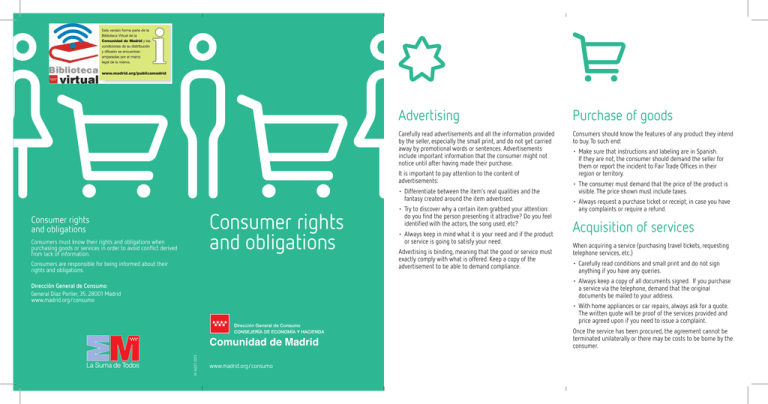
Advertising Purchase of goods Carefully read advertisements and all the information provided by the seller, especially the small print, and do not get carried away by promotional words or sentences. Advertisements include important information that the consumer might not notice until after having made their purchase. Consumers should know the features of any product they intend to buy. To such end: It is important to pay attention to the content of advertisements: • Differentiate between the item’s real qualities and the fantasy created around the item advertised. Consumer rights and obligations Consumer rights and obligations Consumers must know their rights and obligations when purchasing goods or services in order to avoid conflict derived from lack of information. Consumers are responsible for being informed about their rights and obligations. • Try to discover why a certain item grabbed your attention: do you find the person presenting it attractive? Do you feel identified with the actors, the song used, etc? • Always keep in mind what it is your need and if the product or service is going to satisfy your need. Advertising is binding, meaning that the good or service must exactly comply with what is offered. Keep a copy of the advertisement to be able to demand compliance. • Make sure that instructions and labeling are in Spanish. If they are not, the consumer should demand the seller for them or report the incident to Fair Trade Offices in their region or territory. • The consumer must demand that the price of the product is visible. The price shown must include taxes. • Always request a purchase ticket or receipt, in case you have any complaints or require a refund. Acquisition of services When acquiring a service (purchasing travel tickets, requesting telephone services, etc.) • Carefully read conditions and small print and do not sign anything if you have any queries. • Always keep a copy of all documents signed. If you purchase a service via the telephone, demand that the original documents be mailed to your address. Dirección General de Consumo General Díaz Porlier, 35. 28001 Madrid www.madrid.org/consumo • With home appliances or car repairs, always ask for a quote. The written quote will be proof of the services provided and price agreed upon if you need to issue a complaint. M-34237-2013 Once the service has been procured, the agreement cannot be terminated unilaterally or there may be costs to be borne by the consumer. www.madrid.org/consumo Warranties Payment terms and Credit cards Exchange or refunds Claims and complaints Any and all goods purchased have a mandatory two-year warranty. In the case of used goods, the mandatory warranty period may be shorter. If there is a manufacturing defect or the good does not comply with the information provided by the seller, retailers should respond to claims made as follows: The only method of payment that retailers are obliged to accept are legal coins and banknotes. It is not mandatory for retailers to refund the cost of a product unless the goods are faulty, do not match the description or fail to perform as advertised. Only in purchases not made in person (via catalogue, internet, retailers without physical stores), does the consumer have the right to return a product even if it is not faulty. If consumer rights are violated, a complaint should be filed. All commercial establishments have complaint forms available for their customers. Consumers must fill out the complaint form inside the retailer’s premises. Some stores agree to issuing a voucher or even refunding the full amount of the purchase, as a part of their customer service policies. In any circumstance, consumers can always file a claim at the Office of Fair Trading in your region or territory. • If the complaint is made within the first six months of the purchase date, it is assumed that there is a manufacturing defect. • If the complaint is made within the following eighteen months, consumers must prove that a manufacturing defect exists. Make sure to keep the purchase receipt as proof of the purchase date. If the retailer or manufacturer offered commercial warranty on the good, the conditions of said warranty must be in writing. Demand and keep all the documentation along with your purchase ticket • Try to use banknotes in accordance to the amount due since the store may not have change. Retailers are under no obligation to accept credit cards unless expressly publicized, usually by exposing adhesives identifying the types of cards accepted. • Before using a credit card, be sure that the store accepts this method of payment. • Make sure that there are no limitations as to the amount due or any other considerations. Limitations and considerations should be clearly visible to consumers. • Always keep your credit card payment receipts and check your bank statements to make sure that the amounts charged agree with the price of the goods or services acquired. Your purchase ticket will be the only proof of payment if any claims need to be made. Financing of purchases Some stores, especially large retailers, can usually provide financing. If this is the case, it is of vital importance to know the terms and conditions applicable and who is financing the purchase (be it a bank or the retailer). Once the agreement is signed, consumers will be bound by the terms contained in it and will have to pay the full amount due in order to cancel the loan. Before making a purchase, read any information appearing in signs in the store about refund policies and check your receipt. If the retailer’s refund policy is not in writing, consumers will not be able to make any claims. If the retailer refuses to provide a complaint form, call the local police and ask them to issue a written report. Consumers can subject their conflicts to arbitration if the company is a member of the Consumer Arbitration System or accepts to abide by the system in a specific case. This is an extra-judicial dispute resolution system that is quick and free, works like an oral trial and is binding for the company involved. Should you find any irregularities in the product or service acquired, or notice that a store or retailer is not complying with the law, report it to the Fair Trade authorities. Your cooperation in this respect aids public administrations in rectifying incorrect actions on the part of retailers.
